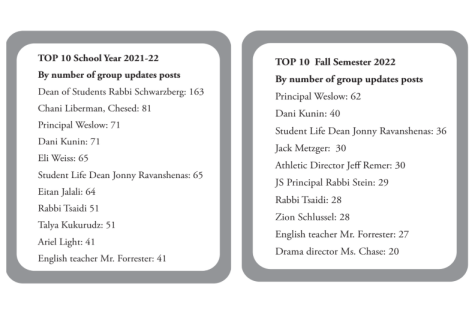How to get yourself to do your homework
And other tips for focusing your way to health, happiness and getting stuff done on time
Concentration: Three seniors do their homework up on the turf.
I just don’t have any motivation to start my homework. Once I start, it’s easy to finish.”
A commonly heard phrase in the halls of Shalhevet, and why wouldn’t it be? Shalhevet students spend approximately 42.5 hours a week in school for around 273 days of attendance. This does not include the co-curriculars, ranging from choir to robotics, that most students participate in.
And then there’s homework.
The hardest part is feeling like the subject is uninteresting and that education is a forced part of life that you never asked for. How do you begin to want to work hard and apply yourself when there is no interest in the subject?
Here are some suggestions to help guide your motivation.
Imagine your deathbed. The first step is to reflect on your life and goals in a very serious manner. Sit in a quiet comfortable place and imagine being on your deathbed. What do you want that to look like? Are you accomplished in your profession and in your social life? Are you surrounded by family? Where do you live?
It might sound like a rather dramatic exercise, but if you do it often, it can become a simple, non-threatening routine for starting your homework.
If those deathbed goals would not be influenced by your grades, maybe it is more important to guide your intense focus on other parts of your life, and spend most of your energy motivating yourself to accomplish other goals.
But remember people do not live in a vacuum. Perhaps your grades are important because you want your parents to be proud of your accomplishments in school, or playing college football is contingent upon maintaining a grade point average.
Any of these reasons is valid and can provide motivation to open your textbook.
Find your grit: Also useful to start your homework it is what author Thomas Frank calls “mental grit,” the ability to soldier on even when you “do not feel like it.”
He points out that feelings cannot change our options. Often we let our negative feelings affect our actions that then affect our feelings, which can be a negative cycle when we allow our negative feelings to convince us to do things that are not in our best interest and that make us unhappy.
Try hard to break the cycle. It is important to know that the more you try to change your stressed or unhappy emotions (or ignore your desire to watch television when you get home), the easier and less painful it will get.
Try mindfulness to stay focused: Turning to homework requires shutting out the external, and mindfulness provides a way to practice starting a task with focus and intention. This is key when switching between studying for Tanach and doing math homework, or starting homework after soccer practice.
Many view mindfulness as a difficult exercise akin to meditation, but it doesn’t have to be. It is often an exercise in self-awareness. Exercises be anything from lying down and tightening and relaxing individual muscles from your toes up, to eating a snack with intense focus. Two of my personal favorites are focusing on thoughts and ideas in the moment and telling others why they are appreciated.
I’m not sure why it works, but I have tried it, and the more I practice, the easier it is to switch between tasks without distraction and with intense focus. I guess the more time you spend being mindful and internalizing, the easier it is to stay present or focused, because you practice exactly that in these exercises.
Get a planner: Another way to remain on task is to rank distractions by level of importance. For example, your teacher emailing you is on the list of things to respond to when doing homework, but a snapchat is not. Once that is done you already know when to allow the distraction or ignore it. The other side of this is prioritizing what you say yes to. Productivity is impossible when you try to do absolutely everything. It is important to learn to say no.
When thinking about multitasking and time efficiency, a planner is absolutely crucial to helping you plan out your many tasks in a time effective manner. Write out every appointment, practice, test and activity, and review your planner every night so that there are no surprises. This makes it is easy to complete assignments before their due dates so there is more time later if a teacher springs a last minute assignment on you.
Remember to make use of free periods or other parts of your school day to complete work in advance, but try to avoid using them to do homework last minute.
If you have properly planned your schedule, nothing should have to be completed last minute.
Really, go purchase a planner. Along with school assignments, it is also a great place to keep track of habits or month goals. Also, if you commit to a social event on your calendar it is important to participate in those events as well.
Additionally, if you do not complete everything on your planner, you still have an ability to see how accountable you were for what you wanted to do.
Feed your brain. Another way to complete tasks efficiently is to do them when you are well fed and have slept. Work is much easier and faster because there will be fewer mistakes to correct.
Make sure there is protein in your diet, and follow a consistent sleep schedule.
Take breaks every 30 minutes to drink water and relax. Any information you want to remember should be learned in the beginning of your homework and reviewed at the end.
Do not go to sleep directly after homework. Leave brushing your teeth until after homework. This will help you retain what you studied the next morning when you wake up.
Know your study style: If you can only learn a language with flash cards, make them in advance and use what works for you. Do not use others’ methods that do not help you.
Organize your space. If everything has a proper place then you will not waste time searching for things.
Watch your time: If you feel like you are taking too long or not getting enough done, time yourself and reflect on whether you actually needed that much time to complete the task. Perhaps you do need to plan for that much time for certain tasks – or perhaps you need more.
When all else fails, O –T- A. So what do you do when all plans go wrong? My favorite method is the O-T-A: observe, think, and attack.
Observe what went wrong. Was it external? Was it a problem with planning?
Think of a way to solve your problem. It is a skill that is hard to learn, but you can always ask for help and research what others have done to fix similar issues.
Attack the issue head-on with your solution.
Even when high school ends, life does not, and there will always be stresses – and most probably a heavy workload. Learn to handle it now by developing your mind, body and spirit, and for the rest of your life, homework – and many other things – will become easier to start, and faster to finish.

Aidel Townsley has written for Boiling Point since she transferred to Shalhevet three years ago. Most proud of her advice pieces for the Boiling Point, she is now Opinion editor. Her other interests include music, psychology and biology.






